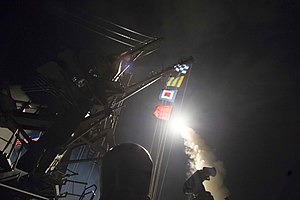2017 Shayrat strike
| 2017 Shayrat missile strike | |
|---|---|
| Part of the Syrian Civil War and the American-led intervention in Syria |
|

|
|
| Operational scope | Single-site targeted military strike |
| Location |
Shayrat Airbase, Shayrat, Syria 34°30′2″N 36°53′57″E / 34.50056°N 36.89917°ECoordinates: 34°30′2″N 36°53′57″E / 34.50056°N 36.89917°E |
| Target | Shayrat Airbase |
| Date | 7 April 2017 04:40 EEST (UTC+03:00) |
| Executed by | United States Navy |
| Casualties | 9 civilians, 7 soldiers killed (per Syrian Government) 9 soldiers killed (per SOHR) |
The 2017 Shayrat missile strike took place on the morning of 7 April 2017, and involved the launch of 59 Tomahawk cruise missiles by the United States from the Mediterranean Sea into Syria, aimed at the Shayrat Airbase controlled by the Syrian government. The strike was executed under responsibility of U.S. President Donald Trump, as a direct response to the Khan Shaykhun chemical attack that occurred on 4 April.
The strike was the first unilateral military action by the United States targeting Ba'athist Syrian government forces during the Syrian Civil War. Trump stated shortly thereafter, "It is in this vital national security interest of the United States to prevent and deter the spread and use of deadly chemical weapons."
The Syrian Air Force launched airstrikes against the rebels from the base only hours after the American attack. The ability to continue to use the base for these attacks has been attributed to the advance warning the US gave to Syria's ally, Russia, prior to the missile strike.
On the evening of 6 April, Trump notified members of the U.S. Congress of his plan on the missile strike. According to a White House official, more than two dozen members of Congress were briefed at the notification. Internationally, the United States also notified several countries, including Canada, the UK, Australia, and Russia, in advance of the strike. The U.S. military stated it communicated with the Russian military to minimize any chance of Russian casualties. White House Chief Strategist Steve Bannon had reportedly opposed the strike, and disagreed with Senior Advisor to the President, Jared Kushner who reportedly favored the strike. The strike was conducted without either U.S. congressional or United Nations Security Council approval.
...
Wikipedia

